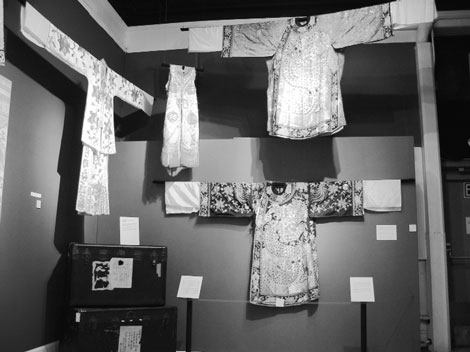By Aileen Torres
Lu Yu has been an actor for most of his life. But, somehow, that word fails to define him. That’s because his artistic impulse is multi-faceted. Simply put, he’s got to sing and he’s got to dance.
“When I was little boy, I always went up on stage by myself,” recounted Yu.
Yu has spent much of the last 30 years helping other young boys and girls get on the stage, too. As a 30-year member of the Henry St. organization, ‘Arts Inc.,’ he teaches arts to public school students throughout the city.
One of his favorite subjects is opera – Chinese Opera.
Yu, 55, was born in Beijing and grew up in Taiwan. The opera influence came from his parents, both of whom studied Italian opera.
He also got into the field because, “I’m very bad in math and science. I’m not Chinese,” he said with a chuckle, exposing a few wrinkles on his slim face.
Yu ended up studying acting at the National Academy of Art High School and signing a six-year contract with a major Hong Kong movie company before graduation. He made a total of 35 movies for the studio and at one point Jackie Chan even served as his stuntman.
But Yu quickly grew bored of being a contract actor. He was making teenage musicals, costume movies and sword-fighting flicks — “Nothing really deep or meaningful,” he said. He also disliked the politics of the Hong Kong movie industry.
“A lot of parts were decided on the mahjong table,” where the powers-that-be informally conducted business, said Yu.
Feeling restless, he moved to New York. Finding himself in Chinatown in 1972, Yu, who has a master’s degree in education, joined Arts, Inc.
Included in that curriculum is his beloved Chinese opera, also the subject of a current exhibit at the Museum of Chinese in the Americas on Mulberry St. “Red Boat on the Canal: Cantonese Opera in New York Chinatown” runs through Nov. 30, 2003.
“Red Boat” refers to the vessels on which opera companies rode as they toured the countryside throughout China. The exhibit includes opera robes and musical instruments.
“Because China is so big, every province has their own dialogue, music and tradition,” explained Yu. “What we call Chinese opera today is really the Peking Opera.”
Yu explained that during the Chin Dynasty, the last dynasty, the emperor, who loved opera, gathered the famous artists from around the country to the capital. The emperor selected his favorite melodies from each and put them together. The result was the Peking Opera and has continued to this day. It’s really a combination of different folk theaters.
According to Yu, although there are a great number of provincial theatre traditions throughout China, they often depict the same themes or stories, typically myths, legends and folk tales.
There are two main themes in Chinese theatre, said Yu. One is romantic, “always about boy meets girl, girls meets boy. They separate for 18 yrs, and then the husband comes back, and the woman’s waiting. All that to represent virtue.”
The other theme is militaristic. “Throughout history, even now, Chinese people are always fighting among themselves,” said Yu, “or the Western or the Northern invaders always come to invade China. There’s always this battle,” which is why many operas are based on actual historical figures and events — a way to preserve history through oral tradition, he said.
Yu is particularly fond of traditional stories. In July 2003, he directed “Butterfly Lovers” at Lincoln Center. He plans to tour the opera throughout China in the near future.
Teaching occupies most of his time now, though he said he “will never give up performing. Performing is in my blood. But what I get the most joy out of is working with children,” said Yu.
Clearly, he seems to be enjoying conveying cultural lessons to, what he hopes will be, a new generation of artists.



























